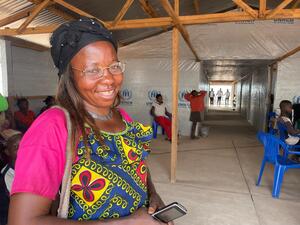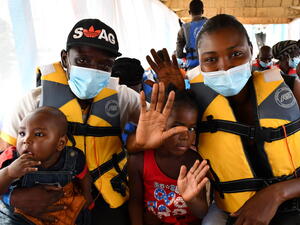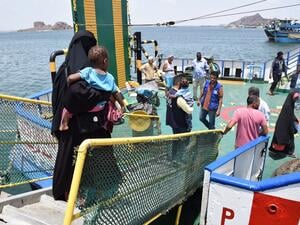Extra plane provides boost to Angolan repatriation
Extra plane provides boost to Angolan repatriation

The voluntary repatriation of Angolan refugees from Zambia's Meheba and Mayukwayukwa Settlements (seen here) began in July 2003. By the following year they were returning from all over the country.
LUSAKA, Angola, November 1 (UNHCR) - With the rainy season rapidly approaching, the acquisition of a second aircraft has given a significant boost to the number of Angolan refugees able to return home each week from Zambia, the UN refugee agency said on Tuesday.
The International Organization for Migration (IOM), which is handling the transport of refugees from Zambia for UNHCR, has secured a second plane and increased the number of road convoys to ensure that some 22,000 Angolan refugees living in three camps across Zambia will have returned home by the end of the year.
"The additional plane, an Antonov, will lead to an additional 120 more refugees being repatriated to Angola each day," said UNHCR's Regional Representative in Zambia, Ahmed Said Farah. Before the introduction of the second aircraft, there were only two flights per day, six days a week, he noted.
The repatriation from Zambia is part of a broader UNHCR repatriation programme that has seen refugees returning home from all the neighbouring countries where they fled during Angola's long civil war. However, the great majority have come back from Zambia and the Democratic Republic of the Congo.
A total of some 86,000 Angolan refugees have come back from Zambia since 2003. So far this year, more than 15,000 have returned from Zambia under the UNHCR repatriation programme, after it resumed on 10 May. About 12,000 of these were transported by air.
Domingo Mate, an Angolan refugee waiting to repatriate to Angola, thought the introduction of an additional plane would help the repatriation operation keep up with the demand during the last few weeks of the season: "Since we were using one plane, the pace of going back home was a bit slow, but now more are assured of going back," he said.
The sixth meeting of the Zambia-Angola-UNHCR Tripartite commission, which met in Lusaka in early September, recommended that IOM secure a second aircraft and increase the number of road convoys before the start of the rainy season.
The voluntary repatriation of Angolan refugees from Zambia began in July 2003, and some 18,140 refugees repatriated before the end of that year. Most of those who repatriated in 2003 had been living in Meheba Refugee Settlement, while others were from Mayukwayukwa Settlement. All were destined for Cazombo, a city in eastern Angola.
In 2004, the voluntary repatriation exercise resumed on 15 June, initially by road only. However, later on, airlifts were introduced to take people back to areas that could not be reached by road. The Angolan refugees were by now being repatriated from all the camps and settlements - namely Nangweshi and Ukwimi as well as Meheba and Mayukwayukwa. By the end of the 2004 repatriation season, a further 27,525 Angolans had been repatriated.
With the exception of some Angolan refugees returning from South Africa and the Republic of Congo, the organized repatriation is scheduled to end this year, as the number of Angolans remaining outside the country and planning to return dwindles. But the programme may still be extended for operational reasons into the first quarter of 2006.
Refugees returning on their own after the end of the organized repatriation will continue to receive the return assistance provided at UNHCR reception centres inside Angola. In 2006, UNHCR says its main focus will be on supporting the re-integration of the returnees in their home areas - which include some of the most isolated and heavily damaged parts of Angola.
Since 2002, a total of more than 333,000 refugees have returned to Angola from all countries, nearly 200,000 of them with assistance from the UN refugee agency, Farah said.
By Kelvin Shimo in Lusaka, Angola








